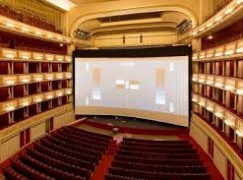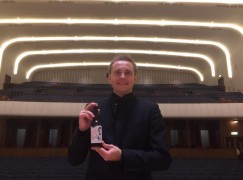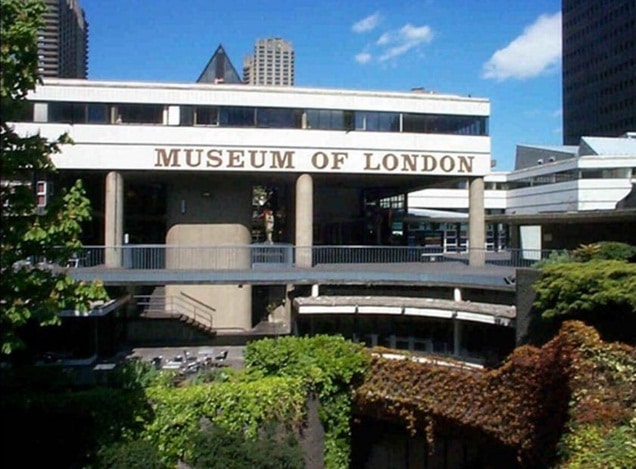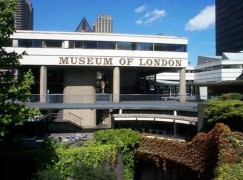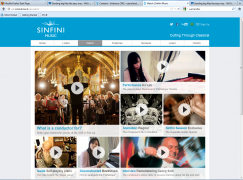16 December 2015
Proposals for a Centre for Music in London move forward as feasibility study published
As London expands, a proposal for a building to inspire a new generation of music-lovers:
-
A world-class concert hall, built for the digital age
-
An education facility offering immersive experiences for all
-
A digital offer available to the whole of the UK and internationally
-
Engagement for London’s communities and young people
-
A renewed commitment to London as a world musical centre
Proposals to build a new state of the art Centre for Music in the heart of London took a step forward today with the announcement that the Government will provide £5.5 million in funding for a full business case for the project while the City of London Corporation has agreed its willingness in principle to make land available for the site.
The opportunity to begin the next phase comes as a feasibility study exploring options for a new world class music facility in London is published. The study sets out an economic, business, cultural and educational case for a potential new Centre for Music in London, and highlights a significant moment of opportunity in delivering an outstanding new facility in the capital.
The Government is making £5.5 million available via Arts Council England to fund the development of a detailed business plan and analysis of costs and benefits; work on the initial design for the building; explore the options for funding the project and beginning fundraising; and undertake extensive consultation with the arts and education sectors.
Meanwhile, the City of London Corporation is backing this vision by agreeing in principle to make the land available for the Centre, significantly reducing the external funding requirement for the project. This support is part of the City’s ambitious plans to transform the area surrounding the Barbican into a world-leading cultural hub for the arts, heritage and learning.
The six-month initial feasibility study, Towards a World-Class Centre for Music, was commissioned by the Chancellor of the Exchequer and the Mayor of London in February this year. The report has been produced by the Barbican Centre, the London Symphony Orchestra (LSO) and the Guildhall School of Music & Drama alongside expert specialist teams.
At the heart of the vision outlined in the study are proposals for a world-class concert hall for the digital age, an ambitious educational offer to bring music making to millions and a commercial plan that would maximise the revenue raising and fundraising potential of the new Centre.
It would be a place for all, hosting a diverse programme of classical and contemporary music; fulfilling the belief of the three organisations and incoming LSO music director Sir Simon Rattle that everyone is entitled to experience the joy of music-making; and it would welcome audiences in an area that will be transformed over the coming years through new transport links and investment.
The Centre could act as a beacon for music in this country, delivering world-class acoustics in a building that would be the first of its kind in the UK to be designed and delivered in the digital age. With education and accessibility at its core, the new Centre for Music would aim to have the same transformative effect on public engagement with music that Tate Modern brought about for contemporary art. It would be home to the LSO, as well as a venue for guest orchestras and the BBC Symphony Orchestra, who would continue its Associate relationship with the Barbican across both the proposed Centre for Music and the Barbican Hall.
Building on the longstanding existing partnership between the Barbican, LSO and Guildhall School, the Centre would seek to work with orchestras and music and education organisations from across London and UK to develop opportunities for everyone to experience, participate in and learn about all aspects of music. This collaborative offer would aim to reach hundreds of thousands of people directly and millions virtually through digital learning resources available to all.
The feasibility study considered a number of locations, with the study recommending the current site of the Museum of London as the preferred option. This site will become available when the Museum fulfills its ambition to expand into a new location in West Smithfield. Its current site could see a complete transformation with the existing building removed to make way for a landmark development. The land and streets around the site could be radically reimagined to ensure the new Centre is accessible and welcoming to visitors with improved links to the Barbican Centre and Guildhall School, tourist destinations such as St Paul’s Cathedral and Tate Modern as well as the two new Crossrail stations in the area.
A complementary part of the plan set out in the feasibility study would be to redevelop the current Barbican Hall as a home for innovative contemporary music and performance, while LSO St Luke’s would be adapted to enhance its community focused and digital recording facilities. Alongside the Guildhall School’s acclaimed new medium-scale hall at Milton Court, this would create an internationally outstanding collection of linked venues at the heart of a world-leading cultural city.
The feasibility study concludes that the Centre for Music could consolidate the UK’s position as a world-leading centre for the cultural and creative industries and deliver important benefits to London and the UK. This includes additional tourism, economic benefits related to London remaining at the forefront of the global music industry, wellbeing benefits for audiences arising from engaging with music and consuming music digitally, and longer-term benefits for individuals and society at large from education and engagement activities.
The feasibility study estimates the benefits of investing in a Centre for Music, alongside the proposed works to the Barbican Hall and LSO St Luke’s, would deliver a net present value of over £890 million to the UK economy. Based on international benchmarking the estimated construction cost of the proposed new Centre is in the region of £278m. As part of the next phase of the project the partners will be doing detailed costing work and business planning alongside exploring options for funding the project and ensuring that it offers the best possible value for money.
The Mayor of London Boris Johnson said:
“I welcome the Government’s backing for the next phase of the Centre for Music project. It would create a world-class concert hall to compete with those in other global cities and help to reshape an increasingly important cultural quarter in central London at time when Crossrail will be bringing in many more commuters and visitors. It would also be investing in the long term future of culture, creativity and tourism, which are of huge importance to the UK economy, as well as music education, not just for local youngsters, but for young people up and down the country.”
Mark Boleat, Chairman of the City of London’s Policy and Resources Committee said:
“The City of London Corporation has a long history as a leading investor in the arts including the Barbican, Guildhall School of Music & Drama, London Symphony Orchestra and Museum of London in the Square Mile. Together we are working to transform the area from Farringdon to Moorgate and the evolving cultural hub to create an unparalleled destination that is an internationally renowned, distinctive, vibrant and welcoming centre for the arts, heritage, learning and entertainment. A potential new Centre for Music and new Museum of London are a key part of our vision for the cultural hub and will help to redefine this area of the City well in to the future and reinforce the City’s central role in the cultural life of the country.”
Sir Nicholas Kenyon, Managing Director of the Barbican Centre said:
“We are very pleased that the Treasury and the GLA, who commissioned the feasibility study, are supporting the next phase of the project. The strong commitment of the City of London Corporation coupled with the funding provided by the Government enables us to move forward. As the study demonstrates, the Centre for Music is not just viable but could be transformative, significantly raising the profile and visibility of music and offering world-class arts and learning opportunities for all. The elements are all there now to create a unique opportunity: we want to work with all our partners to shape and realise the vision in a way that can be inspirational for all.”
Kathryn McDowell, Managing Director of the London Symphony Orchestra said:
“We are immensely grateful for the support of all the organisations and dedicated professionals who have contributed to this study, giving us a blueprint, not only a permanent home for the LSO but a major new contribution to London’s international status as a destination for great music. We are excited to be moving forward with Sir Simon Rattle, and working closely with colleagues in the Barbican and the Guildhall School to realise these plans.”
Professor Barry Ife, Principal, Guildhall School of Music & Drama said:
“As one of the world’s leading conservatoires and the UK’s largest provider of music education for under-18s, the Guildhall School is extremely excited about the prospect of a Centre for Music. We believe in the power of music to change lives, and this development will be a beacon for music education, stimulating interest in live performance and inspiring the next generation of music makers. Combined with an innovative use of technology, the Centre promises to be truly transformative.”
Sir Simon Rattle said:
“The Centre for Music has the potential to be an extraordinary place that will make music central to people’s lives. There is still much to do to move this from dream to reality, so this is exciting news. I’m delighted to see the project advancing, and look forward to the next phase of work.”
Sir Nicholas Hytner, External Adviser to the Feasibility Study said:
“I’ve been pleased to give some external input to the feasibility study: it makes a really comprehensive and convincing case for a new Centre for Music in London. As the study shows, investment in this project has the potential to be transformative for music and music education in this country, and I am delighted that it is now proceeding to the next phase with the support of the Government and the City of London.”
Ends.
Note to Editors:
About the Towards a World-Class Centre for Music feasibility study
Link to the executive summary here and full study here
The feasibility study was carried out alongside expert consultants, GVA Acuity and Arup Associates, and Gardiner & Theobald, with input from DP9, Gordon Ingram Associates, Nagata Acoustics, Regeneris, Baker & McKenzie and Ruth Jarratt, with External Advisor Sir Nicholas Hytner and consultation by Bonnar Keenlyside and Peter Phillips.
Feasibility Study Review Group
Members included representatives from Arts Council England, City of London Corporation, Department for Culture, Media and Sport, Greater London Authority and HM Treasury.
Centre for Music Project Group
Members included representative from Barbican Centre, City of London Corporation, Guildhall School of Music & Drama, London Symphony Orchestra.
Next stage
The next stage of the project will involve completing the full business case for the project, agreeing the terms for the acquisition and development of the preferred site, developing the concept design to RIBA Stage 2 and beginning the private sector fundraising with a view to securing a lead funder. As part of this phase, the productive dialogue that has begun with stakeholders, including with orchestras, music and education organisations from across London and the country, will continue.
About the Barbican, LSO and Guildhall School
The Barbican, London Symphony Orchestra and the Guildhall School’s relationship is a pioneering cultural alliance between a world-class orchestra, arts centre and conservatoire in the City of London offering an unrivalled programme for audiences and transformative opportunities for young people.



